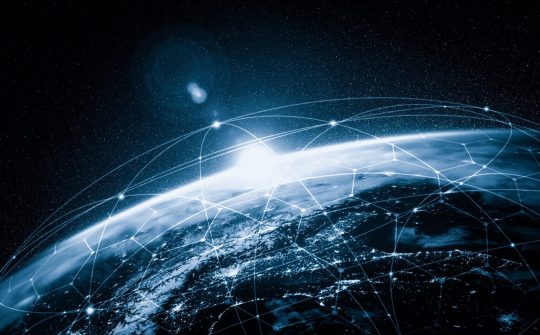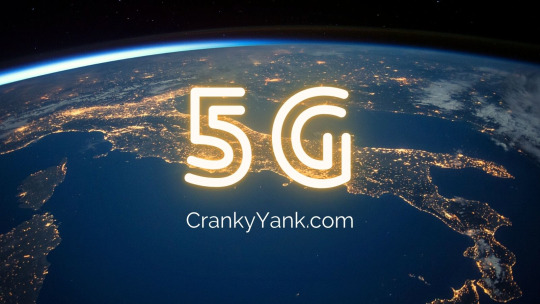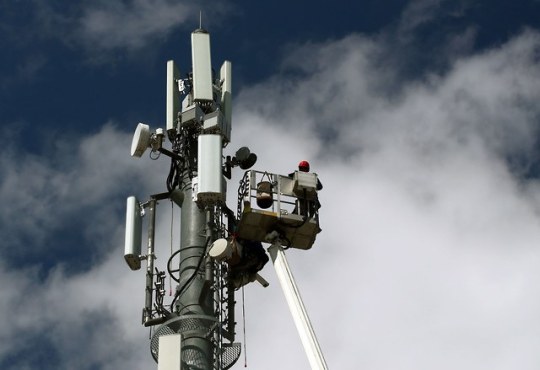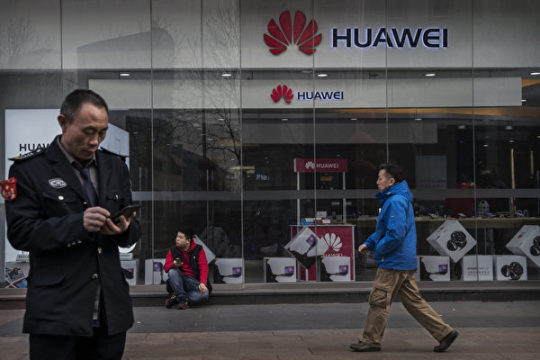#rivada networks
Text
Rivada gets more breathing room to deploy constellation
Rivada Space Networks plans to start deploying a constellation of 600 Ka-band satellites. Credit: Rivada Space Networks
TAMPA, Fla. — International regulators have waived a requirement for Rivada Space Networks to launch 10% of its proposed 576 satellites by September, boosting plans to fund the multibillion-dollar connectivity constellation.
Rivada expects to start deploying commercial…

View On WordPress
0 notes
Text
[Premiering Wed. Aug 31, 7 PM ET] Entrepreneur Battling Communist China for Control of ’Goldilocks Zone’
[Premiering Wed. Aug 31, 7 PM ET] Entrepreneur Battling Communist China for Control of ’Goldilocks Zone’ https://link.theepochtimes.com/mkt_app/premiering-wed-aug-31-7-pm-et-entrepreneur-battling-communist-china-for-control-of-goldilocks-zone_4698718.html?utm_source=andshare
0 notes
Link
And this too is reminiscent of organized-crime tactics...
1 note
·
View note
Link
* * * *
LETTERS FROM AN AMERICAN
December 4, 2020
Heather Cox Richardson
While coronavirus continues to burn across the country, Trump is focusing instead on continuing to contest the election results and on the Pentagon.
The main story in the country continues to be the coronavirus. As of tonight, according to the New York Times, more than 14,441,700 people in the U.S. have been infected with the virus and at least 278,900 have died. Official daily death counts are well over 2000.
As several states continue to count votes from the November election, President-Elect Joe Biden’s popular vote margin over Trump is now more than 7 million. Pennsylvania, Wisconsin, Nevada, Georgia, Arizona, and Michigan, all states in which Trump contested the vote, have already certified their election results for Biden. In all six of those states, judges have ruled that Trump’s lawyers have provided no evidence of fraud. They have used words like “baseless,” “flimsy,” “obviously lacking,” “dangerous,” and “not credible.”
Trump’s obsession with winning an election he has clearly lost has brought into relief the struggle for control over the Republican Party. Trump is clearly trying to turn the party into a vehicle for loyalty to him and him alone. He has always turned on those who no longer serve his interests: Alabama Senator Jeff Sessions was one of the first elected Republicans to support Trump’s 2016 presidential candidacy, giving it an air of legitimacy. He left the Senate to become Trump’s first Attorney General, only to have Trump turn against him when he recused himself from the investigation into Russian interference in the 2016 election, because he had lied about his own contacts with Russians. Trump forced Sessions to resign, and when Sessions ran again for the Senate, endorsed his rival and attacked Sessions on Twitter. Sessions lost his primary.
Now Trump has turned on men who similarly sacrificed their careers for his. Three days ago, Trump’s loyalist Attorney General, William Barr, undercut Trump’s election fraud arguments when he said that he had not seen such fraud. This apparently so infuriated Trump that he is considering firing Barr. Then, this morning, Trump turned on loyalist Louis DeJoy at the head of the United States Postal Service, who removed mail sorting machines and changed USPS rules to slow mail-in ballots expected to be for Biden. Trump tweeted that the USPS “is responsible for tampering with hundreds of thousands of ballots” and thus stole the election from him. He called the USPS a “long time Democrat stronghold,” although DeJoy is a major Trump supporter and donor.
While Trump is talking about running again in 2024, his turning against his most loyal supporters in the Republican Party will not inspire others to rally to his banner. Instead, it may simply be that he’s keeping the idea of his candidacy alive because it keeps money flowing in. Since the election, he has raised more than $200 million in donations.
While he is fighting over the election results, Trump has done very little else except to replace civilian employees at the Pentagon with his own hand-picked loyalists. This is unusual in a lame duck period, when presidents usually try to smooth the transition to the next administration.
Far from trying to smooth that transition, Trump is making it as bumpy as possible. His appointee at the General Services Administration delayed the start of the transition for weeks. Now that Biden’s team finally has access to Trump’s people to learn about their planning for the rollout of the coronavirus vaccine, it turns out there hasn’t been much planning. Biden today noted that “There is no detailed plan that we’ve seen, anyway, as to how you get the vaccine out of a container, into an injection syringe, into somebody’s arm…. It's going to be very difficult for that to be done and it’s a very expensive proposition…. There’s a lot more that has to be done.”
Also disturbing is that the Trump administration has denied the Biden team access to U.S. intelligence agencies that are controlled by the Defense Department, including the National Security Agency (which is the nation’s largest U.S. intelligence service), the Defense Intelligence Agency, and other intelligence services with a global reach. The Biden folks have, though, been able to meet with their counterparts at the CIA and the Office of the Director of National Intelligence.
The refusal of the Pentagon to meet with Biden’s people comes at a time when Trump has been shaking up personnel there. Immediately after the election, Trump fired his fourth Defense Secretary, Mark T. Esper, and replaced him with an acting secretary of defense, Christopher C. Miller. Miller, in turn, has presided over the installation of a number of Trump loyalists both in the Pentagon leadership and on the Defense Policy Board, a group of advisors who consult with the Defense Secretary on specific issues when asked. Pushed out were about a dozen advisers, including former Secretaries of State Madeleine Albright and Henry Kissinger, as well as former House Majority Leader Eric Cantor.
Today, there was another major purge at Defense, this time from the Defense Business Board, a nonpartisan group of about 20 volunteers from the business sector who are appointed to give business advice to Pentagon leaders. The White House threw nine people off the board—informing them with a terse email—including its chair, Michael Bayer. Trump replaced them with his former 2016 campaign manager, Corey Lewandowski, and that year’s deputy campaign manager, David Bossie, among other loyalists. Both Lewandowski and Bossie are outspoken Trump supporters who have led the fight to contest the election.
So has another Trump nominee for a Pentagon post, Scott O’Grady, who has endorsed the idea that Trump won by a landslide and that Trump should declare martial law. Trump has nominated him to become an assistant secretary of defense for international security affairs, overseeing operations in Europe, the Middle East, and Africa.
Exactly what Trump is doing with this packing of the Defense Department is unclear. There are, though, three major issues on the table right now that may or may not be involved, but are worth keeping in mind.
The first is that Trump is trying to remove many U.S. troops from around the world before he leaves office, and had gotten serious pushback on that from the people he has now purged from the Defense Department. Today, he ordered nearly all of about 700 U.S. troops out of Somalia, where they have been training local soldiers to hold ground against terrorists. They will not come home, though; they are being sent elsewhere in Africa.
There is also still hanging out there the administration’s sudden announcement of a $23 billion sale of arms to the United Arab Emirates, including a number of advanced F-35 fighter jets and Reaper drones. Lawmakers of both parties object to this sale, concerned about risks to Israel and that the UAE could transfer the technology to China and Russia. The Senate will vote next week on banning the sale.
There is also the effort by the White House to force the Pentagon to lease its airwave spectrum to a private company, Rivada Networks, to create a nationwide 5G network. Rivada is backed by major Republican figures, including operative Karl Rove, but established Pentagon officials have little interest in the project, pointing out that there is no proof that Rivada knows what it’s doing or that the plan would be legal. It’s also not clear that the use of this spectrum for private carriers wouldn’t impact its use for national security. The Defense Department spectrum the White House would like to lease to private investors is worth between $50 and $75 billion.
I always believe in following the money, and that’s especially true now as Trump’s years in the White House, which have given him access to huge sums, are drawing to a close.
—-
[FROM COMMENTS]
Scott M. Krasner
I waver between bewilderment and rage when reading these daily summaries. I can almost "understand" his more political moves - installing loyalists, withdrawing troops, even trying to sell access to the Defense Department's wavebands. I don't agree or condone these actions, but they're consistent with his approach to governance to date.
What's comprehensible is ignoring - in any and every way - the coronavirus and its impact. Unconscionable doesn't begin to describe his failure to acknowledge the deaths of 280,000 Americans, or to endorse any means of protecting each other as best possible. It's inhumane. It's devoid of empathy, morally vacuous, and ethically deplorable. It is unequivocally and unalterably wrong.
And yet 74,000,000 thought it acceptable to return him to office. McConnell has personally obstructed any efforts to extend relief for 8 months and counting. It's Hobbseian in its social brutishness. Even Hobbes might be appalled. And Republican leadership is mute.
I'm almost beyond shock. Since the beginning, many thought each of Trump's transgressions would be the last straw, yet nothing happened. The only apparent imposition of accountability is his having lost the election. Court losses haven't swayed him. Our perverse campaign finance laws have given him license to steal despite the misleading fine print. His Cabinet, always incompetent for the task, is asleep, silent, or in on the game. Each day goes by with no visible effort to limit his efforts to salt the earth in advance of his successor. And Republican leadership ignores or enables him to proceed unhindered.
He's unmoored. He's looking to preemptively pardon family and loyalists who are most likely would be criminally liable but haven't yet been charged. His most ardent supporters are almost insane (read Giuliani and Powell) or seditious (read Flynn and Lin Wood). And still the Republican party watches with bloodless faces and dead eyed stares, saying not a word.
What is one to think? How does one explain this to children? How can one reason with any family, friends, or acquaintances who somehow believe Trump is in the right, brought low only by a grand, silent conspiracy of wrong minded citizens and foreign actors?
Perhaps history can look upon Trump's reign of terror more dispassionately. Today, however, I and many others feel like we're helpless, our minds and sensibilities best represented by the visage of horror in Edvard Munch's The Scream.
*
Linda Mitchell
Hannah Arendt's book (based on her reporting for The New Yorker), "Eichmann in Jerusalem: A Report on the Banality of Evil" encapsulates the issues TCinLA and the people who posted replies to it raise. I have read only bits of it but what she presents is a picture of evil that is stripped of glamour and that indicts everyone. As she says about Eichmann, "Except for an extraordinary diligence in looking out for his personal advancement, he had no motives at all." If you have access to JSTOR (you can read online for free but not download if you don't have access through a library) there is a great short article in The History Teacher (1981) that discusses Arendt and her book in clear and concise terms. https://www.jstor.org/stable/493684
Miller and most everyone else surrounding the Deranged Cheeto--including the criminal enablers in Congress--fit Arendt's description perfectly. They are not monsters. They are not (most of them) pathological narcissists. They are sterile, unoriginal, uncreative people who have decided that personal advancement through doing terrible things is fine with them. It is actually harder, in our modern world, to be a good person than to be an awful one. Empathy, emotional maturity, awareness, and wisdom all require effort on the part of the individual. One has to engage, one has to become self-aware, one has to be brutally honest with oneself. Evil simply requires reaching down to that lowest common denominator of the id: a desire for self-advancement by any means necessary.
This is why they all seem so petty, so puerile, so childish, so joyless. This is why their tantrums are so infantile. And this is why Biden and Harris seem, by contrast, so refreshingly mature, so willing to allow joy. Both have been radically affected by what Hegel referred to as the "slaughter-bench" of history. The subhumans surrounding the Unelected Ex-President have not got enough imagination to be affected by anything except their own hunger.
[LETTERS FROM AN AMERICAN]
HEATHER COX RICHARDSON
2 notes
·
View notes
Text
'It's a f*cking goat rodeo': Inside Trump & GOP's chaotic conspiracy to install Rivada Networks
‘It’s a f*cking goat rodeo’: Inside Trump & GOP’s chaotic conspiracy to install Rivada Networks
https://twitter.com/bywillpollock/status/1342909240785186819?s=20
After four agonizing years of relentless criminality from Russian-owned mobster and his fixers, nothing surprises me.
Enter Rivada Networks.
This astonishing story is about an American commodity of immense value and complex systems of wireless bandwidth usually in the purview of the military. I’ll do my best to elucidate the…

View On WordPress
#5G#angel investor#axios#barack obama#billionaire investment#brad parscale#brookings#cnn#commerce secretary#commodity#conservatism is a lie#craig moffett#department of defense#free market#goat rodeo#jake tapper#joe biden#kamala harris#ligado networks#mark meadows#mid-band spectrum#midband spectrum#newt gingrich#obama administration#pete thiel#peter thiel#rivada networks#russia#russian forestry#socialism
0 notes
Text
Defense Department ‘5G Nationalization’ Charge Is Cover For A Wireless Industry War
New Post has been published on https://perfectirishgifts.com/defense-department-5g-nationalization-charge-is-cover-for-a-wireless-industry-war/
Defense Department ‘5G Nationalization’ Charge Is Cover For A Wireless Industry War
NEW YORK, UNITED STATES – 2020/10/15: T-Mobile network advertises seen on a Jumbotron in Times … [] Square. (Photo by John Lamparski/SOPA Images/LightRocket via Getty Images)
by Erik Sherman
The race is on for the United States to catch up to China’s lead on 5G. Yet Washington is fighting over whether the valuable electromagnetic spectrum should be sold to AT&T and other big telecom giants, which have contributed to congressional campaigns for decades, or whether it should be leased to a well-funded upstart named Rivada, some of whose board members are supporters of President Donald J. Trump.
Whichever firm wins the spectrum has the potential to reap billions in revenue and spend billions in infrastructure and equipment. With these high stakes, a classic inside Washington duel is underway.
The spectrum is currently held by the U.S. Defense department; it was awarded to the military several decades ago and has rarely, if ever, been used by war fighters. 5G is a wireless standard that allows faster and more data-intensive uses of the Internet. 4G is the standard most widely used on U.S. smartphones; 3G still dominates in some regions. Everything from self-driving cars to remote diagnoses of homebound patients turns on the rapid adoption of 5G.
5G is critical to many businesses because it offers “a faster and more improved wireless network for data,” according to wireless and telecom analyst Jeff Kagan.
At bottom, the fight is over whether the government should sell or lease the unused spectrum. An outright sale could pour billions into the U.S. Treasury in a giant one-time financial event. By contrast, a lease would produce fewer dollars at first but yield a stream of payments to the Treasury over many years. The government’s take in that scenario is projected to be more money over the life of the lease than a sale would produce. (A lease renewal would produce yet another string of payments.) The idea of a lease was first advocated by former Google CEO Eric Schmidt.
At stake for consumers is the cost of accessing the Internet on their smartphones. Since a spectrum lease would have lower upfront costs, Rivada says it would not have to recover billions in lease costs for mobile Internet users—potentially saving Americans money while speeding adoption of 5G technologies. AT&T and other telecoms typically amortize their spectrum acquisition costs over a period of years. AT&T lobbyists did not return calls for comment from Zenger News.
The debate about selling or leasing the spectrum is largely being waged with claims of “nationalization.” Since a lease would leave ownership of the spectrum in the hands of the federal government, the telecom giants’ spokesmen have said President Trump wants to “nationalize” the spectrum. Leasing it to private firms isn’t nationalization, which typically involves a government seizing private assets, Rivada CEO Declan Ganley said.
This is the latest battleground between potentially disruptive entrepreneurs and major carriers like Verizon, T-Mobile and AT&T.
The Pentagon’s bands of spectrum are important because they are “mid-band,” sitting in the middle of all frequencies that companies need to provide robust 5G service. High-band is good for the densest urban settings. Low-band matches rural settings well. Mid-band can do both.
As for mid-band, “it’s excellent for coverage and capacity,” said Alex Besen, CEO of mobile data industry management consulting firm The Besen Group. The Pentagon has some of the choicest spectrum allocations in the ranges that will be the 5G workhorse. “This is the crème de la crème,” Besen said.
And everyone in the industry wants it.
The ‘nationalization’ charge
The Department of Defense has more spectrum than it needs, barring a big national emergency, and has considered how to make more of it available for private use. The Defense department already said it will make some available for lease through auction conducted by the Federal Communications Commission.
The U.S. spectrum fight is also part of larger global trend. India and other nations are debating plans to auction the spectrum held by their own defense agencies. “Every other country is moving in the same direction,” Kagan said.
The Defense department sought ideas for making even more frequencies available, in a recent Request for Information. One question it posed was whether the department could operate a domestic 5G network and make its capacity available to for-profit firms and others. “They know the answer is no, [the Defense department] should not own and operate a commercial 5G network and they have no notion of doing so,” said Ganley, whose Rivada Networks has unique dual-use technology for sharing 5G networks that would allow the Pentagon, in seconds, to take back the spectrum in a national emergency. Rivada would profit from a spectrum-sharing arrangement. “Sharing raw spectrum, they’ve been every much open to that and they’ve been open to that for some time now,” Ganley said.
As for running a data network, “There’s no one in the DoD [Defense department] that would ever want to do that,” Ganley said. “There’s nobody in the department of defense, neither side of the aisle politically, who wants that.”
Killing competition
The interest in making spectrum available, though, isn’t popular throughout the wireless industry. “It’s going to upset a lot of operators,” Besen said. A large amount of spectrum that did not land in the control of the big carriers would rock Establishment players. “It’s going to impact their bottom line on the wholesale side of the business.”
This would create a whole new, competitive market, Ganley said. “You’d have a capacity wholesale market,” Ganley said. Companies could run their uses at odd hours, with lower pricing as happens in the electric market. “Imagine if the cost of each device is 3 cents a year [rather than something like $30 a month] because it’s doing its thing at 4 am.”
The change in pricing would make it possible for more experimentation and for services and devices to offer more than is currently economically viable. “You’re going to see whole new industries develop around that kind of access,” Ganley said. “That changes the game.”
It could also make big companies with investors nervous. More entrants and more competition usually translates into lower margins for higher-cost legacy players. So expect more talk about “nationalization” until the Pentagon and the White House announce a final decision, which is expected Friday.
From Leadership Strategy in Perfectirishgifts
0 notes
Link

Rivada Networks offers free 5G in Jamaica Developing Telecoms
0 notes
Quote
The court also noted that FirstNet had assessed that Rivada “possesse(d) few capabilities staff, or financial resources”; did “not itself have material experience in…building and operating a nationwide wireless network”; and lacked any experience in “supervising a project of the size and scope” of the nationwide public safety broadband network. (…)Beyond that, and less transparently, is the push by the White House to force the Pentagon to hand over control of this mid-band spectrum to Rivada
Administration officials alarmed by White House push to fast track lucrative 5G spectrum contract, sources say - CNN
0 notes
Photo

Karl Rove and a Pitch for a Nationwide 5G Network Tailored to Trump’s 2020 Campaign likely to give Russia a back door to every connection Sue Halpern writes on an insurgent telecommunications company Rivada, chaired by Declan Ganley, with funding from Peter Thiel and Karl Rove, and its play to monetize the Defense Department’s unused radio spectrum, to bring 5G cellular services to rural America.
0 notes
Link

在华为的国家安全问题成为舆论焦点,华为和中共不断否认和要求拿出证据的情况下,有必要揭示华为对美国国家安全构成的威胁,阐明为何华为给美国乃至全球带来的安全挑战是真实不虚的。
“华为和中共陆媒对于安全指控,最常见的辩解是没有‘证据’证明华为产品不安全。这种说辞其实是不负责任的狡辩,是对中国民众的欺骗。”大纪元记者何坚在其分析文章“关于华为你应该知道的六个常识(上)、(下)”中写道。
那么中国电信巨头华为带给美国的风险究竟是什么?美国通信公司一名创始人将中共在5G上对美国的威胁比作二战时期的珍珠港事件。
也有资深国会议员用美国发生的911恐袭暗示华为进入的是美国要害部门。她亦透露,美国的机密情报早已证实,华为对国家安全构成直接挑战。
在华为的国家安全问题成为舆论焦点,以下是从公开渠道收集的美国国会、智库、科技界人士对华为安全风险的看法,华为给美国乃至全球带来的安全挑战真实不虚。
一、华为不能摆脱中共政府的影响
美国国会鹰派人物和情报机构从2007年左右就开始关注华为在美国的扩张。2012年,美国国会众议院情报委员会在经过一年时间调查,包括赴香港与华为创办人任正非面对面会谈后发布报告,认为美国使用华为的设备,会给中共情报机构提供机会撬开美国的电信网络。
报告说,华为与另一家通讯公司中兴通讯没能配合这一年来的调查,也没能充分解释他们在美国的商业利益是否跟中共政府有关。
“根据保密和非保密的情报,华为和中兴不能免受外国政府的影响,因此对美国和我们的系统构成安全威胁。”当时的情报委员会主席迈克?罗杰斯(Mike Rogers)和民主党议员达奇?鲁珀斯伯格(DutchRuppersberger)在撰写的报告中写道。
当时,罗杰斯和鲁珀斯伯格在新闻发布会上说,他们曾要求中国公司表现得更加透明,但这两家中国公司既片面又矛盾的回应让他们感到失望。
罗杰斯更提到,委员会担心这些公司其实是中国(中共)政府的附属机构。
《华盛顿自由灯塔》报导说,众院的报告反映了美国的担忧:华为等中国公司进入美国市场,其提供给中共军方的设备和信息有可能在未来的网络战中,反过来对美国公共和私营电信网络不利。
华盛顿智库美国企业研究所(AEI)中国问题专家史剑道(Derek Scissors)表示,在中国,“政府一直与公司手拉手合作,这是中国(中共)的标准做法。”
他说,由于中国(中共)政府与国家商业之间的依存关系,它们认为凡是对中国企业有利的、对中共国家安全的就可以网开一面,甚至使用军事或情报部门监视外国私人公司也完全可以接受。
“中情局和美国军方绝不会为了美国公司采取行动来监视中国公司,但中国(中共)绝对会这么做”,史剑道说。
在华为首席财务官孟晚舟被加拿大逮捕、美国寻求引渡的情况下,中共将孟案上升到政治层面也说明,华为与中共政府的关系非同一般。

图为美国众议院情报委员会2012年发表的对华为,中兴的调查报告封面。(美国众议院情报委员会网站截图)
二、911事件说明华为风险大
华为的任正非在2013年发言否认了美国国会的上述指控,但这并不能减轻美国情报机构对华为的谨慎态度。在2018年2月国会的另一场听证中,情报机构FBI、CIA和NSA的负责人都建议美国公民不要使用华为手机。联邦调查局局长雷伊(Chris Wray)说华为“有能力进行未被发现的间谍活动”。
美国情报官员曾多次暗示,他们对华为有确凿的不当行为案例为证,但目前情报官员尚未公开这类证据。
所以现在就形成了一个很有趣的局面:美国知道华为做了什么,华为也知道自己做了什么;但美国没有讲明华为做了什么、所以华为权衡后就干脆搅浑水。
那么华为对美国的真实威胁有多严重?
加州民主党众议员安娜?艾许(Anna Eshoo)在2012年恰好是众议院情报委员会成员,有权接触华为的机密情报,她在2018年5月的一场听证会上证实了华为对美国存在的现实威胁。
她表示,这些年来她一直非常严肃地对待华为的问题及其代表的挑战。
“因为当美国遭到911袭击时,有一件事在国家安全方面帮助了我们,那就是我们的电信部门。这是要害。”她在众议院通信与技术小组委员会举行的主题听证会上说,“我从机密简报中已获知(华为带来的)挑战是什么”。
艾许表示,现在审查华为的挑战是非常重要的,“美国不能与这些公司勾勾搭搭,它们对我们的国家安全构成直接挑战”。
同时,她呼吁针对华为带来的现实威胁进行跨党派合作。众所周知,国会两院2018年一致性通过的“2019年国防授权法”,禁止美国政府使用中国公司华为或中兴的产品。
新泽西州民主党众议员弗兰克?帕龙(Frank Pallone)也表示,美国绝大多数网络设备现在都由外国公司在海外制造,大多数此类设备运行良好且不会造成任何问题。
“但我们的情报机构已经确定华为和中兴通讯等具体的中国公司对美国国家安全构成了特定的威胁。”他说,“设备可能内置后门,允许他国真空汲取对我们的所有数据。且设备一旦安装,几乎不可能检测到这些后门。”

希腊军队在特洛伊战争中,用一只大木马攻破特洛伊城如同中国人讲“明修栈道,暗渡陈仓”。图为特洛伊木马模型。(李曜宇/大纪元)
三、中共的特洛伊木马计划用华为开道
众议院通信与技术小组委员会于2018年5月举行的主题听证会“电信、全球竞争力和国家安全”,邀请网络专家出席,系统介绍了华为与中兴对美国存在的国家安全威胁。
弗吉尼亚理工大学电子休谟国家安全和技术中心(Hume Center for National Security and Technology)主任查尔斯?克兰西(Charles Clancy)表示,华为在全球许多国家和地区都部署了电信基础设施、核心交换机和路由器,其中一部分通过服务协议完成。
他指出,存在的现实风险是,哪怕华为在美国的市场份额相当小,但只要存在美国网络中的华为设备本身进行软件更新或加载新固件,甚至是它的供应商在合同支持下登录并访问华为的系统,这两种情况都会带来操作安全风险。
“软件中的后门或故意漏洞极难被发现,特别是如果它们刻意隐藏起来的话。”克兰西强调说。
而华为作为中共5G技术的重点扶持对象,未来的威胁就更大。美国通信公司里瓦达网络(Rivada Networks)的创始人德克兰?甘利(Declan Ganley)将中共在5G上对美国的威胁比作二战时期的珍珠港事件。
甘利表示,北京已经发现了一个在全球范围内主导网络领域的机会,为了建立5G网络,中共一直在全球范围内利用(当地)移动运营商作为“特洛伊木马”为中国公司进行游说。
“这是一个很厉害的计划,并且几乎奏效了”,他解释说,当地移动运营商想要使用中国公司的技术,因为中国公司的技术得到中共的国家补贴显得更便宜,而当地移动运营商(由于私营性质)又不受本国战略问题的约束、更容易成为帮中国企业说话的对象。
外界认为,华为敢搅浑水的原因也就是这两个,一个是华为这些年的全球市场扩张,其规模已不可小觑,另一个是华为寄望于没被铁证可以证实华为违法。
四、华为设备已引发各国担忧
目前,已有十余个国家因无法降低对华为的担忧,明令或实际禁止华为进入下一代电信网络(5G)。
华为设备是否存在后门是其中一个安全关注。美国智库战略与国际研究中心(CSIS)的中国网路专家萨门?萨克斯(Samm Sacks)在国会作证时表示,中国(中共)政府正在利用一些渠道提高他们监控网络、数据以及途经的信息流的能力。
她解释说,硬件和网络组件的后门是能被设计成避开检测的,如果是在供应链开发过程开始时就被引入的漏洞,那将尤其难被检测。
电子安全专家克兰西也告诉美国国会:“我们需要谨慎对待,不仅要审视最终出售产品给我们的公司,还要关注生产过程中处于幕后的所有部件,把它们作为供应链整体风险管理的一部分。这一条不仅适用于某些网络中已使用的华为和中兴设备,还要查看它们进入美国设备的生产零部件。”
美国智库国际战略研究中心(CSIS)副总裁、网络安全研究员詹姆斯?路易斯(James Lewis)更表示:“美国政府总体上已经决定,除非我们回击,否则中共永远不会停止行为不端。”他曾任美国国务院和商务部外交事务官员以及资深行政人员。
路易斯打了一个简单比方形容采用引入华为5G技术的危害。“比如一个帮你建房子的人想要闯入你的房子,他就会有优势,因为他们知道房屋布局、电力系统、接入点,有可能他还留了一把钥匙,甚至可能暗中进入房子。”他说。
路易斯表示,公司之间、国家之间在5G领域进行激烈竞争并不奇怪,若中国公司是在正常的商业环境中运作,成为5G供应商也不是问题,甚至中国公司极有可能会做得很好。
但事实是,华为和中兴无法拒绝中共政府的要求,而洞察中共政府对国外客户(开展的行动)的一个重要指标就是看看它如何对待自己的国民——中共政府正对自己的国民进行普遍监视,这才是西方国家拒绝华为的重要原因。
美国国务院网络安全事务副助理国务卿罗伯特?斯特雷耶(Robert L. Strayer)日前也公开表示,允许华为和其它中国公司进入5G,将使中共扩大其在全球大部分地区的监控范围。
美国、澳大利亚、新西兰已经就华为发出5G禁令。同时,美国也在呼吁加拿大、英国、欧洲和其它国家禁止华为加入5G。
五、华为押注无证据或功亏一篑
美国知名律师事务所Wilkinson Barker Knauer的合伙人克里特?约翰逊(Clete Johnson)表示,硬件和网络组件的后面取决于产品提供商是谁。
“美国政府和情报界的公开记录是我们特别关注华为和中兴的部分原因。”约翰逊在出席2018年的国会听证时说。“绝大部分的提供商都会警惕,避开那些被政府认定、要特别关注的公司。”
他指出,对于规模小得多的小型供应商而言,出于低成本考虑,避开华为可能会困难一些。“中国(中共)政府知道这一点,华为和中兴也知道这一点,所以它们削减价格,竞争对手的最低价格是多少,它们就按照那个价格削减。”约翰逊说。
但在川普政府将华为摆在国家安全的高度,华为退出、其它竞争者的进驻也可能给小型供应商带来新机会。而华为押注美国或其它国家无证据,或也是一场豪赌。
中国问题专家横河告诉大纪元,“华为‘农村包围城市’的战略还在继续,真正对华为的打击将是禁售芯片,如果西方盟国一致抵制华为也有这个效果。”
他说,若孟被引渡成功的话,对华为也是重大打击;此外,孟案审理结果导致美国对华为的金融制裁也会是重大打击。
大纪元记者何坚表示:“华为产品存在安全隐患并非外国的抹黑,而是客观事实。之所以缺乏很具体的证据细节,也不是因为华为的清白,而恰恰是中共封锁了可以揭开真相的途径,阻碍任何涉及到中国大陆的深入调查。”
来源:Epochtimes
苹果已不是美国人最爱 被它取代
大陆新闻解读591期_严真点评+外交部大实话:美国督促盟友封杀华为 ·瑞典驻华大使被拉下水 ·中美北京谈判鸡同鸭讲 ·《流浪地球》拍成了太空版的《董存瑞》
芒格对美国债务增长表示担忧
裴毅然:如果没有美国 世界无法想象!
美国人为什么能活得如此简单?
冻结委石油公司资产后 美国加码制裁委五名高官
期限近 美国15亿美元彩票奖金尚无人领
30岁美国小哥年赚600万美金!
洪博学:美国智库围绕中国问题的内战
原文链接:分析:华为安全风险 你需要了解的五件事 - 新闻评论
本文标签:中共, 中国, 任正非, 华为, 国家, 孟晚舟, 安全风险, 美国, 风险
0 notes
Link
LETTERS FROM AN AMERICAN
October 21, 2020
Heather Cox Richardson
As we enter the home stretch to this election, we are bombarded with so much news the only way to make sense of it is to divide it into categories.
The president is angry and self-pitying while campaign officials are trying to tip the election with the dubious laptop story. Administration officials are also working as quickly as they can to push through whatever they can while they are still in power, hoping what they are doing flies under the radar with so much going on. And this flurry of activity means there are bad slips.
At the same time, Democratic candidate Joe Biden is trying to get elected, but in such a storm of crazy that his actual policies, which are quite developed, are simply not getting much airtime. Instead, people have begun to look to him as a return to an America in which strength was measured not by dominance but by caring.
The president began the day by tweeting about Biden’s proposed tax plan, which he calls “the Radical Biden-Harris Agenda.” He claims that the plan will “slash the typical American’s income by $6,500 per year. They will raise TAXES by $4 TRILLION DOLLARS – triggering a mass exodus of jobs out of America and into foreign countries…. Your 401k’s will crash with Biden. Massive Biden Tax and Regulation increases will destroy all that you have built! Additionally, 180 Million People will lose their Private Healthcare Plans.”
In fact, though, it is the administration that is talking about slashing things, including millions of dollars from Democratic-led cities that Trump and Barr have labeled “anarchist jurisdictions”: New York City; Portland, Oregon; Washington, D.C.; and Seattle, Washington. That money would cut federal grants for coronavirus relief, HIV treatment, newborn screening, and so on. Officials from the affected cities, as well as the U.S. Conference of Mayors, say they will sue if the administration tries to follow this through.
In a move that threatens to destroy our nonpartisan civil service, Trump today signed an Executive Order creating a new category of public servant who is not covered by normal rules. These employees can be hired by agency heads without having to go through the merit-based system in place since 1883, and can be fired at will. This new “Schedule F” will once again allow presidents to appoint cronies to office, while firing those insufficiently loyal. It also appears to shield political appointees from an incoming administration by protecting them from firing because of political affiliation.
Yesterday, an inspector general for the United States Postal Service issued a report requested by Congress examining the effects of Postmaster General Louis DeJoy’s changes to the postal service. The report concluded that the changes resulted in “significant negative service impacts across the country.” DeJoy is a Trump loyalist. The USPS Board of Governors, made up of Trump appointees, rejects the report’s conclusions.
Meanwhile, a number of senior administration officials and lawmakers from both parties are worried that the White House is fast-tracking a business deal worth billions of dollars in what is essentially a no-bid contract to a company associated with Republican operatives, including Karl Rove. The company, Rivada, wants to lease the Department of Defense’s mid-band spectrum. This spectrum is wildly valuable for the 5G market, the next-generation mobile network. Pentagon leaders are opposed to the deal since the military uses that spectrum, and they say they have not been able to study the effect of commercial use of the spectrum on military readiness. Pentagon lawyers say the White House has no authority to sell or lease its spectrum. Lawmakers of both parties oppose the deal. One senior official told CNN, “Something is really fishy about this.”
Today, Director of National Intelligence John Ratcliffe blamed Iran for hacked emails purporting to come from the alt-right Proud Boys warning Democrats to vote for Trump. Ratcliffe said “we have identified that two foreign actors, Iran and Russia, have taken specific actions” relating to the election. He said the emails were designed to hurt Trump. Senate Minority Leader Chuck Schumer (D-NY) told Rachel Maddow that intelligence officers in a classified briefing about the matter did not, in fact, say that there was any attempt to hurt Trump. “I’m surprised that Ratcliffe would say that to the public…. I had the strong impression it was much rather to undermine confidence in elections….”
Meanwhile, Trump continues to push the laptop story. He is reportedly considering firing FBI director Christopher Wray after the election because Wray has refused to announce an investigation into Biden, his son Hunter Biden, or other Biden associates. After Wray’s refusal to back up Trump’s insistence that this summer’s violence was from “Antifa,” the FBI director’s unwillingness to announce a Biden investigation is apparently infuriating the president. In 2016, then FBI director James Comey announced a new investigation into Hillary Clinton’s emails just 11 days before the election, an announcement political scientists say helped to swing victory to Trump. While the president can, in fact, fire an FBI director, it is unusual, and certainly should not happen because the director refuses to attack the president’s political rival. The term of the FBI director is set at 10 years so the director serves at least two presidents, and is not bound to the political cycle.
Trump is railing not just at Wray, but also at Attorney General William Barr. Trump was counting on Barr’s probe of the Russia investigation to implicate high-ranking members of the Obama administration just before the election, but Barr has backed off on delivering the report. Trump is frustrated, recently retweeting a photo of Barr with the caption “for the love of GOD ARREST SOMEBODY.” Barr has been staying out of the news lately, although he was in Memphis, Tennessee, today, announcing arrests made there under his Operation Legend, the name for the police crackdown in a number of cities announced in July.
Pushing the story of Hunter Biden’s laptop got a lot more difficult today when Sacha Baron Cohen revealed that his new Borat film shows Trump’s lawyer Rudy Giuliani—the source of the laptop-- in a compromising position with a young woman. Giuliani insists the scene is a “complete fabrication,” but the stills I saw (and I was trying really hard not to see any of this) indicate that this explanation will convince only those determined to be convinced. As many observers have pointed out, if Baron Cohen could prank Giuliani so easily, what does that say about how well Giuliani could identify foreign influence operations?
For his part, Biden is acting like a normal presidential candidate, which just doesn’t grab the headlines the way Trump’s actions do. After Trump attacked Biden’s tax policy, though, a number of stories noted the actual terms of the plan.
Biden proposes to raise taxes on the wealthy. He would get rid of some of the 2017 Trump tax cuts, including the cut in the income tax rate for people making more than $400,000 a year. Trump cut that rate from 39.6% to 37%. Biden would put it back where it was. This change would affect fewer than 10% of taxpayers. People would also pay into the Social Security payroll tax for incomes over $400,000. That tax is currently collected only on $137,700 of earnings. Under this plan, the nation’s top 1% of earners would bring home about 15.9% less money after taxes than they do now.
Biden also proposes to raise the corporate tax rate from 21% to 28%, and establish a 15% minimum tax on the so-called “book income” of a corporation, that is, the amount its directors report to shareholders, which often makes a corporation look quite profitable while it pays little or no tax. He would also increase taxes on international profits. These proposed taxes would make up more than half of the revenue the Treasury would see from the new measures.
The Biden proposals would raise between $2.4 and $4 trillion over a decade. The Penn Wharton Budget Model concludes that the top 1% of earners would pay about 80% of the tax increases. Its report continues: “All groups outside of the top 5%... see their after-tax incomes fall by less than 1 percent.” The Washington Post awarded four Pinocchios to Trump’s attacks on Biden’s tax plan. The Tax Foundation could not score Trump’s own plan because he has made no actual proposals.
Biden had powerful help today getting out his message. Former President Barack Obama, who has largely stayed out of the political fray, has reentered it powerfully. In a speech in Philadelphia, Obama directly attacked Trump, tearing apart his successor’s response to the coronavirus and his administration in general. No one gets under Trump’s skin like Obama does, and the former president seemed to be deliberately needling the president, perhaps to prod him to more self-destruction at tomorrow’s debate.
His appearances were not just attacks on Trump, though. They were reminders of what the presidency looked like just four years ago, and they were designed to make sure people get to the polls. “We’ve got to turn out like never before,” President Obama said. “We cannot leave any doubt in this election…. A whole bunch of people stayed at home and got lazy and complacent. Not this time,” he said. “Not in this election.”
Still, what made most news for Biden today was an old video of the former vice president at a memorial service for Chris Hixon, the athletic director at the Marjory Stoneman Douglas High School, who died when he tried to disarm the killer. In the clip, which circulated widely on social media, Biden expresses his sympathy to Hixon’s parents and is walking away when Hixon’s son Corey, who has Kabuki Syndrome, runs up and, as Biden turns to see what’s happening, throws himself into Biden’s embrace. Biden spontaneously kisses the young man’s forehead and asks if he’s okay. When he shakes his head no, Biden hugs him, cradling his head, and reassures him, “It’s going to be okay. We’re going to be okay, I promise.”
—-
LETTERS FROM AN AMERICAN
Heather Cox Richardson
#quotes#Letters From An American#Heather Cox Richardson#politics#political#election 2020#corrupt GOP
1 note
·
View note